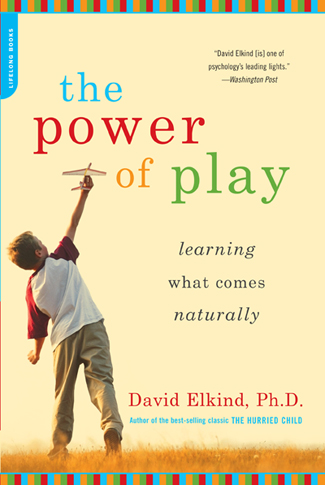Preschooler: "My cousin is coming to visit me this weekend!"
Me: "That's wonderful. You must be so excited. What will you do with your cousin?"
Preschooler: "Play Mario."
Me: "Fun. Will you also play outside?"
Preschooler: "No! We can't play Mario outside!"
Me: "That's true. What do you like to do when you go outside with your cousin?"
Preschooler: "Well...we mostly just don't go outside."
Unfortunately, the bigger issues presented in this brief conversation aren't specific to this child. Frequent media input, lack of creativity, and limited time spent in active and outdoor play have become standard aspects of our culture in regards to children.
I recently finished this book by Dr. David Elkind and would highly recommend it! It's a call to remember the importance of spontaneous, unstructured, self-initiated play. Elkind reminds us that play is crucial for social, emotional, cognitive, and physical development and is what gets children ready for learning in the first place.
He spends a few chapters talking about media input in the lives of children today and the pros and cons of the various television programs, computer games, and "lapware" programs frequenting the homes of the modern family. But this is what I found shocking. In a recent survey of 1,065 parents with infants and preschoolers, it was found that:
- 25% of children under two have televisions in the bedroom
- Two-thirds of children under two use some kind of screen media for about two hours on a typical day
- Children under six spend an average of two hours a day with screen media -- three times longer than they spend reading or being read to
These numbers make my jaw drop and my head ache. Can that be true?! It would explain so much, but there's a large part of me that doesn't want to believe it.
And then I see things like this... A commercial that I haven't been able to stop thinking about in over a week:
I would say something here about the carefully placed, not-so-subliminal messages about parenting...
Or the way they pose the question "How does your baby learn?"... and answer with "Laugh & Learn Puppy"...
But I think I'll let Dr. Elkind share his thoughts with you in a much more eloquent manner instead!
"...these educational toys for young children are another example of how toys have become part of the consumer culture. Parents are encouraged to buy such toys to give their children an educational edge. And there is a subtle message that parents who do not buy these toys for their children are really not doing a good job as parents." (Elkind, 36) (emphasis mine)
"Parents who talk, play with, or sing to their young infants or toddlers give them much more than any DVD or television program ever could. The most important stimulus to healthy growth and development for infants and young children is affectionate human interaction." (Elkind, 47) (emphasis mine)
"The sheer number of toys owned by contemporary children weakens the power of playthings to engage children in dramatic thinking...[Children appear] to look to toys for amusement and distraction, not imaginative inspiration." (Elkind, 16) (emphasis mine)I'm thankful that this certainly isn't the case in all families.
I'm thankful that we have so many electronic resources at our disposal for the times that we really do need them.
And I fully understand the benefits of media for the busy parent who just needs to keep their child entertained for a bit while they get some things done.
But as parents, educators, and advocates for the youngest, let's remember the importance of spontaneous, self-initiated, creative play.
Let's let them be little.


You are echoing my heart! Thanks for reading the book, writing about it and encouraging me to pull it off of my bookshelf to read it myself!
ReplyDelete